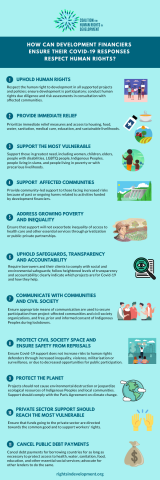
The Maryknoll Office for Global Concerns signed the following statement from the Coalition for Human Rights in Development, issued May 18, 2020.
In a statement published today, the Coalition urged development finance institutions to ensure that the funding and support they provide for the Covid-19 response, and during the economic recovery period, upholds human rights and leads to economic justice for those who are most vulnerable.
We see that Covid-19 and the ensuing economic lockdowns are having unequal impacts, hurting already vulnerable communities the most and exacerbating issues around inequality, violence, militarisation, and surveillance. DFIs have committed to contribute billions of dollars as part of the global response to the Covid-19 pandemic. While we recognize that the pandemic necessitates an urgent response, members and community partners of our coalition have concerns about the implications of DFI support and how this money will be spent.
A significant amount of DFI support is going toward governments and other clients with poor human rights records. There are gaps in transparency and accountability. And in many cases the money will go to corporations and banks and may never reach those who are the most vulnerable. At the same time, the focus on combating the spread of Covid-19 has created additional risks and challenges for those standing up for their rights or speaking out against development activities that are harming them and their communities. Thus, Covid-19 is both a test and an opportunity for DFIs to align their policies and practices with laws, policies and standards on human rights and responsible business conduct.
DFIs’ response to Covid-19 should support equitable and universal access to healthcare, food, water and other essential services. This includes avoiding projects that harm the environment, displace people, increase surveillance and militarisation risks, or threaten sustainable livelihoods and food security.
Recognizing that there are real challenges to meaningful consultation and participation due to the pandemic, especially in communities that are worst hit by the crisis, DFIs should take additional steps to support communities’ access to the information, power and resources they need to determine their own development paths. This means DFIs should take steps to plan for the changed environment around reprisals and restricted freedoms, and ensure that their Covid-19 response supports, and does not hamper, communities’ ability to hold DFIs, governments, and other actors accountable, now and into the future.
SIGNATORIES
Coalition members:
Accountability Counsel;
Alyansa Tigil Mina (Alliance to Stop Mining);
Asociación Interamericana para la Defensa del Ambiente;
Buliisa Initiative for Rural Development Organisation (BIRUDO);
Community Empowerment and Social Justice Network (CEMSOJ);
COMPPART Foundation for Justice and Peacebuilding -Nigeria;
Derecho Ambiente y Recursos Naturales (DAR);
Environics Trust; Forest Peoples Programme;
Fundeps (Foundation for the Development of Sustainable Policies);
Gender Action;
Global Witness;
Green Advocates International;
Initiative for Right View (IRV);
International Accountability Project;
International Rivers; Jamaa Resource Initiatives;
Maryknoll Office for Global Concerns;
Network Movement for Justice and Development (NMJD ) – Sierra Leone
Ouy Tolgoi Watch – Mongolia;
Recourse;
RECODH;
Sustentarse;
Witness Radio – Uganda.
Others:
African Women’s Development and Communication Network – FEMNET;
AfricanDefenders (Pan African Human Rights Defenders Network);
Alliance Sud;
Business & Human Rights Resource Centre;
Center for Economic and Social Rights;
Centro de Investigación, Documentación y Asesoría Poblacional-CIDAP;
Chirapaq, Centro de Culturas Indígenas del Perú; Civicus;
CLEAN (Coastal Livelihood and Environmental Action Network);
Combat Climate Change Network – India;
Eco development foundation – Mongolia;
European Network on Debt and Development (Eurodad)
First Peoples Worldwide;
Grupo de Estudos: Desenvolvimento, Modernidade e Meio Ambiente (GEDMMA-UFMA) -Brazil;
Fundación Integral para el Desarrollo Regional FINDER;
Human Rights International Corner ETS;
Joy for Children;
Mekong Watch;
MOCICC;
Mongolian women’s employment supporting federation
Nouveaux Droits de l’homme Congo Brazzaville;
Observatoire d’études et d’appui à la responsabilité sociale et environnementale;
Proyecto sobre Organización, Desarrollo, Educación e Investigación (PODER);
Pontificia Universidad Católica del Perú;
Protection International Mesoamérica;
RV Serviços Sociais e Ambientais Colaborativos;
University of Wollongong.
Infographic courtesy of rightsindevelopment.org
